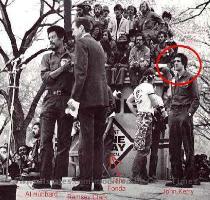Afghan president pledges that women’s rights will not be sacrificed for peace with Taliban
By Robert H. Reid, APSunday, August 22, 2010
Afghan pres: Women’s rights will not be sacrificed
KABUL, Afghanistan — President Hamid Karzai gave assurances Sunday that the rights of Afghan women will not be sacrificed in pursuit of a peace deal with the Taliban.
In an interview with ABC News’ “This Week with Christiane Amanpour,” Karzai also pledged to vigorously fight corruption and allow two Western-backed investigative teams to pursue corruption cases without political interference — even if they go after his friends and allies.
U.S. Sen. John Kerry warned Karzai this month he was risking the loss of congressional support if he did not take significant steps to stamp out the bribery, favoritism and graft that have eroded trust in his government at a critical phase in the war.
Karzai said he was willing to talk peace with Taliban figures who break with al-Qaida and other terrorist groups — a key U.S. condition — and accept the Afghan constitution. He said there had already been “individual contacts with some Taliban elements” but not formal negotiations.
The president acknowledged fears among Afghan women’s groups and ethnic minorities that their political, economic and social gains might be eroded under a future peace agreement with the Taliban, which banned women from most jobs and education during their years in power.
Those concerns were heightened last week when Taliban militants in northern Afghanistan stoned a young couple to death for adultery in the first confirmed use of the punishment here since the hard-line Islamist regime was ousted in the U.S.-led invasion of 2001.
Karzai said he was in “deep, deep shock” over the stoning and would ensure that women’s representation in peace talks would be “solid and meaningful.”
He said the Afghan people must make sure the gains made by women “in political, social and economic walks of life” since the fall of the Taliban were not only protected “but are promoted and advanced further.”
Karzai also promised the two anti-corruption task forces — the Major Crimes Task Force and the Sensitive Investigative Unit — would be allowed to conduct corruption probes of high-level government officials regardless of their political connections.
Karzai demanded more control over the work of the two teams, which are mentored by U.S. and British law enforcement officials, after the recent arrest of a top presidential adviser, Mohammad Zia Salehi, for allegedly accepting a car in exchange for help in exerting pressure on Afghan officials to ease off in another corruption case.
The Obama administration sees Salehi’s arrest as a litmus test of Karzai’s willingness to fight corruption.
Karzai confirmed during the interview that he had intervened “very, very strongly” because Salehi’s civil rights were violated during his arrest.
“This man was taken out of his house in the middle of the night by 30 Kalashnikov-toting masked men in the name of Afghan law enforcement.” he said. “This is exactly reminiscent of the days of the Soviet Union where people were taken away from their homes by armed people in the name of the state and thrown into obscure prisons in some sort of Kangaroo courts.”
Nevertheless, Karzai said the case against Salehi would be allowed to proceed according to Afghan law.
“Corruption should be handled most effectively … and with a lot of pressure, but it has to be across the board and apolitical and without vested foreign interests,” he said.
Karzai also said he would press ahead with plans to disband Afghan and foreign security firms by the end of the year, despite U.S. concern the move might endanger American-run aid and development projects that rely on those companies for their own protection. Private security guards also protect NATO convoys ferrying supplies to American and other international bases throughout the country.
Even before Karzai’s order last week, U.S. congressional investigators had been looking into allegations that Afghan security firms were extorting as much as $4 million a week from contractors paid with U.S. tax dollars and then funneling the money to warlords and the Taliban to avoid attacks against convoys.
Karzai said the presence of dozens of security companies was preventing the development of the government’s own police and army because young Afghan men preferred to take jobs with private firms that pay better and don’t impose discipline.
“I am appealing to the U.S. taxpayer not allow their hard-earned money to be wasted on groups that are not only providing lots of inconveniences to the Afghan people, but actually are, God knows, in contact with Mafia-like groups and perhaps also funding militants and insurgents and terrorists through those firms,” Karzai said.
Tags: Afghanistan, Asia, Central Asia, John Kerry, Kabul, North America, Political Corruption, Political Issues, United States

